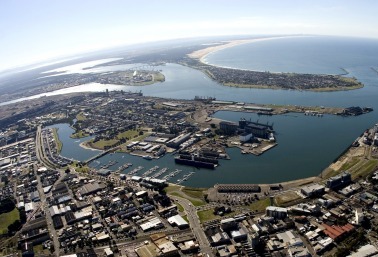
Those of us in the U.S. can learn much about promoting energy sustainable communities from other parts of the world. The Australian city of Newcastle, located in New South Wales, is one of these cities. It was recognized this past spring for its efforts in measuring and managing greenhouse gas emissions, and was also awarded Australia's national prize in 2009 for its environmental stewardship programs, which had reduced electricity consumption by 40 percent from 1995 projections.
The Future is Coming Fast, Start Preparing Now
Newcastle's sustainability efforts shifted into high gear in the late 1990s, when local officials formed a Greenhouse Action Partnership (GAP) comprised of local, state and federal agencies and local electric, water and gas authorities to address the challenge of mitigating greenhouse emissions. The resulting 2001-08 Greenhouse Action in Newcastle (GAIN) plan positioned the city to achieve its vision of becoming "an international testing ground for energy and resource management products and services."
To measure the effectiveness of the GAIN projects, Newcastle collaborated with Australia's Commonwealth Scientific and Industrial Research Organization, the country's national science agency, to create ClimateCam, a first-of-its-kind, web-based reporting tool. This "greenhouse gas speedometer" converted data uploaded by GAP partners on the monthly consumption of electricity, water, and gas and landfill waste into a carbon dioxide equivalent that could be easily tracked and reported. Newcastle also put up a ClimateCam billboard that is described as "the world's first city power meter," publicly displaying the amount of electricity the city has used in the past hour.
The GAIN program resulted in a number of award-winning sustainability projects that saved Newcastle hundreds of thousands of dollars in electricity and water costs and resulted in a 19 percent reduction in greenhouse emissions.
Fast forward to the 2010 International Leading Practices Symposium in Australia, where Newcastle highlighted its latest efforts. Building on the success of its GAIN initiatives, Newscastle developed a new Carbon Management Action Plan. CMAP integrates new technologies and applications that were unimaginable during implementation of the 2001-08 GAIN plan. An expanded version, ClimateCam for Councils, provides an experiential learning program to assist other New South Wales local governments in understanding, measuring and reducing energy consumption and costs. The program is based on Newcastle's energy and resource management philosophy: "If you can't measure it, you can't manage it." The 2007 inaugural program introduced 65 participants from 22 councils throughout New South Wales to Newcastle's Financial Loss Control framework and aided them, through hands-on learning and case-study examination, in understanding basic energy principles, measuring and monitoring their energy consumption and developing similar action plans for their own jurisdictions.
Newcastle also joined forces with the New South Wales Department of Environment and Climate Change (DECC) to roll out ClimateCam for Business, which combines the Council's existing framework with the DECC's Energy Efficiency for Small Business programs. The program offers workshops, subsidized energy audits and rebates for local businesses that empower them to develop strategies for efficient energy and resource management.
Finally, the launch of ClimateCam for Schools provides an energy efficiency monitoring program for local schools that incorporates learning opportunities for students. Since its inception in July 2007, nearly 100 schools have expressed interest in the program, which recruits local business sponsors to underwrite each school's participation.
Implications for U.S. Local, State and Federal Governments
The Newcastle case study offers a number of takeaways for public-sector leaders in the U.S.:
- Collaboration among all levels of government and related agencies is critical to the success of far-reaching sustainability efforts. The Newcastle efforts described above were possible only through the ongoing commitment of Australia's local, state and federal governments and the involvement of a number of energy agencies and partners. While we may wonder whether such intergovernmental/interagency cooperation is still possible here in the U.S., in this new, post-recession environment, we can no longer afford not to try.
- "If you can't measure it, you can't manage it." The documented success of Newcastle's sustainability projects underscores the importance of collecting, analyzing and reporting consumption and performance data on a regular basis. The U.S. must step up our efforts if we are to keep pace with the kind of innovation demonstrated by Newcastle City Council.
- Use new technologies and applications to improve systems and share best practices. The initial collaboration between Newcastle and the Commonwealth Scientific and Industrial Research Organization science agency to develop the ClimateCam reporting tool paved the way for the success of the city's GAIN projects. Upgrading and expanding that technology to facilitate the sharing of the Newcastle best practices provided case studies that other jurisdictions could easily replicate.
- Don't reinvent the wheel; instead, build on success. Typically local governments throughout the U.S. have taken a short-term approach to sustainability, looking to the "next big trend" for ways to create efficiencies. The Newcastle example demonstrates how sustainability efforts can be enhanced over time by building on small successes until they gain critical momentum.
Newcastle offers an excellent case study of the innovative ways in which governments address the issue of community sustainability. ICMA has additional best practices, resources and research on this topic.
New, Reduced Membership Dues
A new, reduced dues rate is available for CAOs/ACAOs, along with additional discounts for those in smaller communities, has been implemented. Learn more and be sure to join or renew today!
